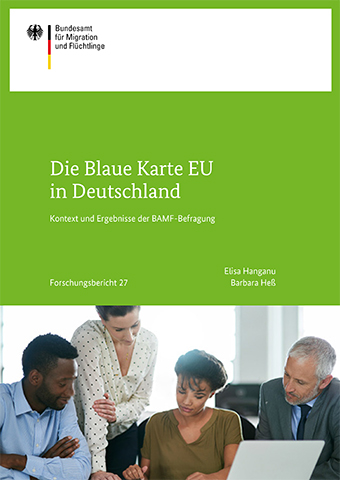The EU Blue Card in Germany ,

The Federal Office's Research Centre has analysed holders of the EU Blue Card in Germany with regard to the training which they have received, their search for work, their prospects to remain and integration. The research report analyses the results of the 4,340 responses that were received.
As the study shows, many of the respondents consider the EU Blue Card to have considerable advantages. These include the possibility of family reunification, mobility within the EU and good prospects to remain. This immigration is also advantageous for Germany: Holders of the EU Blue Card are very highly qualified since only graduates can receive this residence title. This is a precondition for receiving an EU Blue Card. One-third of them have studied in Germany (exclusively or additionally).
Large numbers of much-needed specialists are immigrating
All in all, 89 percent of holders of the EU Blue Card are exercising an occupation in which labour shortages have been identified in the fields of engineering, natural sciences, computers and human medicine. Most of them have professional experience and find well-paid jobs from the outset. A lack of knowledge of German was relatively rarely named as an obstacle. They consider a greater challenge to lie in the fact that the EU Blue Card is initially issued as a time-limited residence title. Roughly one-third of respondents are planning to remain in Germany for ever. Another 39 percent would like to stay for at least ten years, and 22 percent for five to ten years. Only eight percent intend to stay for a short period of time. Nationals of Syria and other countries in the Near East are more likely to intend to remain in the long term, followed by people from Eastern Europe and Central Asia. Respondents from the Northern American and Pacific countries stated more frequently that they intended to stay for a short period only.
The background to the EU Blue Card
Contact

The EU Blue Card is one of the important instruments for steering legal migration to the European Union. It is a time-limited residence title which was introduced in August 2012 in the context of the Directive on Highly-Qualified Employment, targeting highly-qualified immigrants from third countries and offering them prospects to obtain a permanent right of residence at an early date. The EU Blue Card is issued to individuals from third countries who have graduated, who have received an offer of employment in Germany, and who earn a specific minimum annual income (2016: 49,600 Euro). A lower minimum income applies to specialists in the fields of engineering, natural sciences, computers and human medicine (2016: 38,688 Euro).
Evaluations of the Central Register of Foreigners show that a total of more than 49,000 EU Blue Cards were issued in Germany from August 2012 up to and including August 2016.
The report is only available in German.
The study was drawn up by: Elisa Hanganu, Barbara Heß

